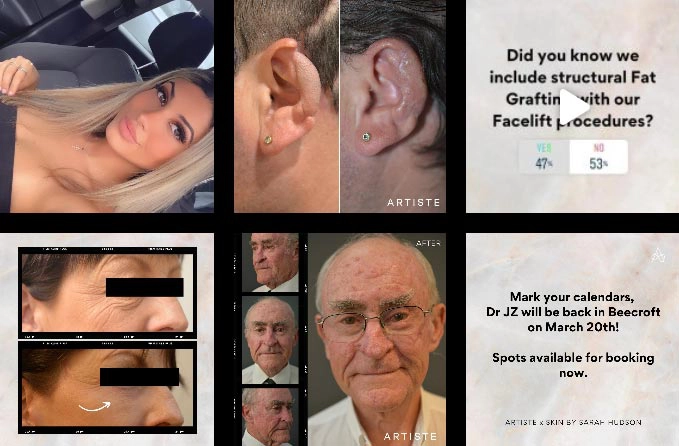Travelling after plastic surgery? Here’s what you should know
Model featured in photography

Whether you’re getting a facelift, rhinoplasty, eyelid surgery or neck lift, there are always safety concerns and precautions you must take before and after any surgical procedure.
Travelling After Plastic Surgery: What to Consider
With holidays approaching, it’s common to want to make travel plans, even following surgery. However, when planning a trip after surgery, there are a few factors to keep in mind. As with other activities, travelling should ideally be guided by a doctor’s advice and considered on an individual basis.
In this blog, we provide information on factors to consider and precautions to take when thinking about travelling post-surgery. For personalised advice and to discuss what might be best in your situation, please consult with your healthcare professional.
Understanding the Risks of Travelling After Plastic Surgery
Increased Risk of DVT
One of the main concerns with travelling after surgery, including flying, is the increased risk of deep vein thrombosis (DVT), which is a blood clot that can form in the legs. In some cases, a clot may travel to the lungs and cause a pulmonary embolism (PE), a serious condition that can be life-threatening if severe.
Factors that can increase the risk of developing DVT after surgery may include age, weight, type and length of surgery, personal and family medical history, and other health conditions. It’s essential to consult with your healthcare provider to understand your individual risk and receive advice tailored to your circumstances.
Potential Risk of Infection
Travelling, including via public transport, can increase exposure to viruses and bacteria. Following surgery, the body’s immune response may be temporarily reduced, which can heighten the risk of infection. For this reason, many healthcare providers recommend that patients avoid travel until they have sufficiently recovered and are no longer at heightened risk.
Signs of infection to watch for at an incision site include redness, discomfort, warmth, fever, and discharge. If you notice any of these symptoms, it’s important to seek medical advice promptly. Always consult your healthcare provider before making any travel plans after surgery to ensure you have personalised guidance for a safe recovery.
Irritation at the Site of the Wound
In the weeks following surgery, it’s generally advised to avoid heavy lifting, as this can place unnecessary strain on healing tissues. Many healthcare providers recommend lifting no more than a light item, such as a gallon of milk, for at least six weeks post-surgery. This precaution means that activities like carrying heavy luggage or lifting bags into overhead compartments are best avoided during this time.
Excessive strain on the incision site may increase the risk of irritation or even infection. Always follow your healthcare provider’s guidelines on activity restrictions, as these precautions are intended to support healing and minimise complications.
Possibility of Medical Emergencies
Travelling soon after surgery brings with it the question, “What if an emergency arises?” Potential complications from surgery may occur, and the initial two to three weeks post-surgery are often the most critical for recovery.
At Artiste Plastic Surgery, Specialist Plastic Surgeon Dr Jack Zoumaras advises patients, including those undergoing facelift surgery in Sydney, to stay nearby during the initial healing phase. This approach ensures timely follow-up care and addresses any concerns that may arise during recovery. Remaining close to the surgical facility allows for prompt medical attention if needed, supporting a smoother and safer healing process.
When is it safe to fly after surgery?
For many people, the question of when it’s safe to travel after surgery is a common concern, especially in today’s fast-paced world. In general, patients are often advised to avoid air travel, as well as long bus or car journeys, for at least two weeks after their procedure.
Travelling after surgery requires careful planning to ensure your health and safety. It’s important to consider factors such as the type of procedure, personal health, and recovery progress, as these can all influence when it’s safe to resume travel. For guidance specific to your needs, consult with your healthcare provider to ensure you’re making the best decision for your recovery and well-being. With his years of experience in cosmetic surgery, including facelift surgery, nose job surgery, neck lift, blepharoplasty, and more, Dr Jack Zoumaras gives detailed post-operative instructions tailored to each patient’s needs, supporting their recovery process. For personalised advice and to discuss your individual goals, we welcome you to book your consultation with us today.
Disclaimer: At Artiste Plastic Surgery, our Plastic Surgeons led by Dr Jack Zoumaras have been trained to the highest possible degree. All surgery has risks and it is always advised to get a second opinion. Risks are very real and we cannot guarantee any result. Results are illustrated as a guide only. All risks are managed and any need for revision surgery or complications (1-5%) can be managed by our specialist plastic surgeons.
Any statements on how you will feel is based on Level V Evidence:
Level V: How you will feel after plastic surgery varies between individuals, depending on psychological and physical factors. Our internal research is based on how patients in our practice feel after surgery.
The blogs are not a substitute for a medical consultation and do not form as part of the doctor to patient relationship.
SHARE THIS ARTICLE
Feb02
Planning Facial Surgery in Bondi Junction? What You Should Know
Disclaimer: At Artiste Plastic Surgery, our Plastic Surgeons led by Dr Jack Zoumaras have been trained to the highest possible degree. All surgery has risks and it is always advised ...
Feb02
Why Experience Matters: What to Look for in a Facial Plastic Surgeon
Disclaimer: At Artiste Plastic Surgery, our Plastic Surgeons led by Dr Jack Zoumaras have been trained to the highest possible degree. All surgery has risks and it is always advised ...
ABOUT ARTISTE
Artiste Plastic Surgery is an Award Winning Specialist Plastic Surgery practice led by internationally trained Dr. Jack Zoumaras, Plastic Surgeon and Peer Reviewed Face Surgeon
Artiste offers the latest Cosmetic Surgical Procedures of the Face, Breast and Body, inspired from leading centres around the world.
STAY IN THE LOOP
Enter your email address below to receive updates on new articles and VIP access to promotions and special offers.
FOLLOW US ON INSTAGRAM
